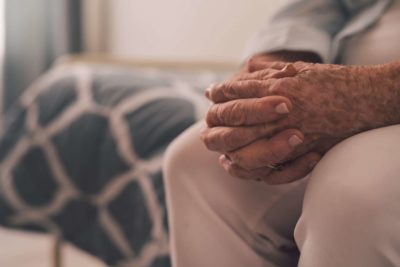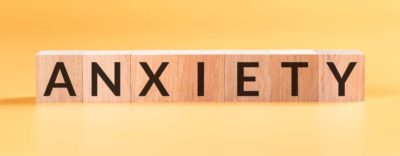
But does anxiety impact older adults more or at a higher rate?
“Until a few years ago, anxiety disorders were believed to decline with age. That’s because older patients are less likely to report psychiatric symptoms and more likely to emphasize their physical complaints,” according to an editorial in the Annals of Depression and Anxiety. “But experts now recognize that aging and anxiety are not mutually exclusive: Anxiety is as common among the old as among the young.”
The Geriatric Mental Health Foundation (GMHF) estimates that as many as 10% to 20% of older Americans suffer from anxiety disorders that, if left untreated, can lead to “cognitive impairment, disability, poor physical health, and a poor quality of life.”
Fast facts about GAD

“Anxiety and worry are not the same thing,” says Debbie Thomas, EdD, APRN, based in Louisville, Ky. “Worry is situational. Anxiety is persistent and excessive – and it doesn’t go away when the specific cause of stress or distress is gone.”
Women are “twice as likely to be affected” by GAD, according to the ADAA.
“Although the exact cause of GAD is unknown, there is evidence that biological factors, family background, and life experiences, particularly stressful ones, play a role,” according to the ADAA.
Symptoms of anxiety
According to the ADAA, symptoms of GAD may include:
- “Feeling nervous, irritable, or on edge
- Having a sense of impending danger, panic or doom
- Having an increased heart rate
- Breathing rapidly (hyperventilation), sweating, and/or trembling
- Feeling weak or tired
- Difficulty concentrating
- Having trouble sleeping
- Experiencing gastrointestinal (GI) problems”
Additionally, seniors with anxiety may also have to go to the bathroom more frequently and experience hot flashes, according to WebMD.
Anxiety risk factors for seniors
As aging comes with its own set of challenges, there are some life events that come with getting older that can trigger anxiety in seniors.
Loss of a spouse or loved one – and the prolonged or extreme grief than can accompany it – can trigger anxiety, according to the GMHF. Likewise, a traumatic event or ongoing intense stress can lead to a diagnosis of anxiety.
The GMHF notes that other risk factors could include:
- “Alcohol, caffeine, drugs (prescription, over-the-counter, and illegal)
- A family history of anxiety disorders
- Other medical or mental illnesses or
- Neurodegenerative disorders (like Alzheimer’s or other dementias)”
Mental Health America also suggests that “chronic medical conditions (especially chronic obstructive pulmonary disease [COPD], cardiovascular disease including arrhythmias and angina, thyroid disease, and diabetes), overall feelings of poor health, sleep disturbance and side effects of medications (i.e., steroids, antidepressants, stimulants, bronchodilators/inhalers, etc.)” can also be risk factors for anxiety.
Does anxiety worsen with age?
According to the Cleveland Clinic, “… mood and anxiety disorders become less common as people age. But detection rates are also lower among older adults. They’re less likely to seek assistance for mental health issues.”
Given the many stressors that often accompany old age, such poor health, decreased mobility, isolation and the loss of loved ones, it’s not surprising that many older adults may experience anxiety. Legitimate concerns, such as the prospect of outliving their resources or of being victimized or falling and breaking a bone, can turn into cascade of overwhelming and debilitating fears.
Additionally, while there is still research to be done, GAD may be intrinsically linked with working memory.
“Research dating back to the 1970s has shown working memory and anxiety to be related,” according to an article on the website verywellmind.com. “Studies have consistently shown that when people experience anxiety, particularly when worry is at high levels – a trademark of GAD –working memory capacity suffers. School/work performance, the ability to use complex problem-solving strategies, and decision-making skills may be compromised.”
The importance of a strong support system
Convincing older adults, many of whom grew up believing mental illness carried a stigma, to talk to a doctor or therapist about their feelings may take some coaxing.
When talking to an older adult about their anxiety problem, “be calm and reassuring”, advises the GMHF.
“Acknowledge their fears but do not play along with them,” according to the GMHF. “Be supportive without supporting their anxiety.”
Most importantly, anxiety is not something they should try to manage on their own. Anxiety can and should be treated by a healthcare professional. A good place to start may be with a senior’s primary care physician, who they likely have a relationship with and can feel comfortable talking about what they are experiencing.
“Treatment can involve medication, therapy, stress reduction, coping skills, and family or other social support,” according to the GMHF’s website.
Finally, seniors should be encouraged to participate in social activities and physical fitness activities. Most importantly, if you suspect your senior loved one is suffering from anxiety, provide plenty of reassurance and support – and love.
For more information, please read:
https://genesight.com/blog/patient/how-to-recognize-depression-symptoms-in-seniors/
https://genesight.com/blog/helping-a-senior-loved-one-with-depression-a-caregivers-guide/
https://genesight.com/blog/patient/understanding-depression-and-anxiety/
Our articles are for informational purposes only and are reviewed by our Medical Information team, which includes PharmDs, MDs, and PhDs. Do not make any changes to your current medications or dosing without consulting your healthcare provider.
The GeneSight test must be ordered by and used only in consultation with a healthcare provider who can prescribe medications. As with all genetic tests, the GeneSight test results have limitations and do not constitute medical advice. The test results are designed to be just one part of a larger, complete patient assessment, which would include proper diagnosis and consideration of your medical history, other medications you may be taking, your family history, and other factors.
If you are a healthcare provider and interested in learning more about the GeneSight test, please contact us at 855.891.9415. If you are a patient, please talk with your doctor to see if the GeneSight test may be helpful.







